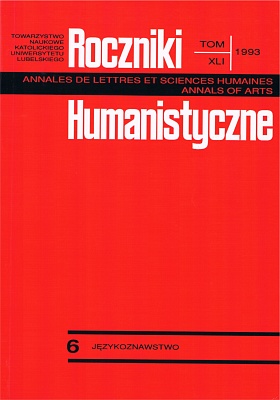„Podhale Archaism” in Ludycje wieśne of 1543
Abstract
The incunabulum Ludycje wieśne (it should be Judycje wieśne ᾿village weather forecast᾽) printed by Florian Ungler in Cracow in 1543 show a very precise differentiation between the vowels y and i. The latter made it possible for the author to state that in the Cracow cultural dialect people used to speak at that time szyja” (neck), żyto (rye), czysty (clean), gen. of drożdży (of yeasts) and w noći (at night) and miedźi (between), unlike śin (son) and koźi (goats), as it was in Ungler’s prints of the years 1532 and 1535. In the latter case we had rather syn and kozy. Soft spirants ś and ź underwent hardening before 1543.
The name of the village Bysina near Myślenice has been recorded in Ludycje as follows: w Bysinie (in Bysina) and z Bysiny (from Bysina) written with si, z Bysyny with sy, w Byszynie with szy, w Byszinie and z Bysziny with szi. The name was created as possessive adjective of personal names Bycha or Bysza and was originally pronounced as Byszina (Byshina), then (after the hardening of consonants which are functionally soft today) Byszyna, in Podhale region Byśina (as śija neck, uśi ears etc.). In the inscriptions w Bysinie and z Bysiny the author sees the group śi not śi. Todaýs pronounciation Byśina was created in the 18th c. The records in Ludycje and various historical documents explicitly justify these statements. The author sees the combinations śi also in the rhyme vsuszy − vdusi − musi (incomplete rhyme: śi − śi). In the rhyme milczy − życzy − w bożnici there is a juxtaposition of ći with ći (complete rhyme). The records and history of the name of the village Bysina and the two mentioned rhymes entitle the author to state that in 1543 in the dialect of the surroundings of Myślenice was „Podhale archaism” as it is today: śija, źito, ćisty drozdźi and śin, koźi, v noći, edźi.
The language of Ludycje had soft i and ǵi, hard χy and probably soft rzi: piosnki (songs), księgi (books), chytro (shrewdly), gwarzili (they chatted).
Copyright (c) 1993 Roczniki Humanistyczne

This work is licensed under a Creative Commons Attribution-NonCommercial-NoDerivatives 4.0 International License.





